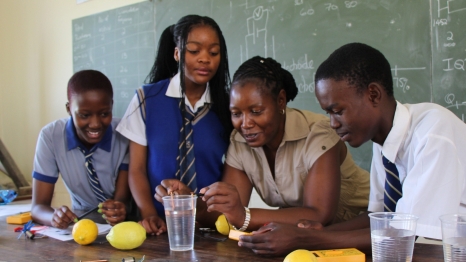
»In the seminars we go through the individual experiments together with other teachers. That gives you confidence.«
Experience it for yourself!
Everyone is in a good mood with the holidays just around the corner. Alfridah Bilankulu has decided to conduct an experiment today with her 10th grade class. Alfridah is a teacher at Musi High School in Soweto, short for “South Western Townships,” which is a district of Johannesburg. For a long time, it was considered as an underprivileged satellite town but since the end of apartheid, it has experienced a slow but continuous upswing. Education has played a key role in that.
Practical training in teacher workshops
Since the mid-1990s, curricula and teacher training, which were strictly divided during the apartheid era, have been aligned step by step. Only recently have experiments become required in the curriculum. For Alfridah, this meant hard work because she had to learn how to perform and teach the experiments herself. She found support in the Experimento advanced training session, which she attended last year.
Experimento is the name of the Siemens Stiftung international educational program. It provides didactic and methodological approaches to classroom experiments. The aim is interactive, real-world classroom instruction that inspires students to discover science and technology and improve their future career prospects. The contents have been adapted to the specific needs and educational curricula of each country, in cooperation with teacher training institutes and local universities.
“The best thing about the Experimento seminars is that you can go through the steps of the individual experiments together with other science teachers. That gives you confidence,” says Alfridah. “Until recently, I was the only physics teacher at Musi High School and wasn’t able to consult with anyone. Through the Experimento workshops, I met another teacher in the area, and we now discuss regularly.”
Learning natural sciences through discovery
While Alfridah still looks for the materials to perform the experiment, the students have already begun to study the instructions and discuss how to set up the experiment. “We need three cups of water – one with table salt and another with citric acid,” says Masego determined. She knows the experiment because her class has already conducted it. The experiment uses various steps to show students how chemical batteries function. “We always need a zinc and a copper nail,” responds Sannah. “Then, we hold them in one of the three cups, and check the voltage.” Everyone stares at the multimeter. Nothing happens – dozens of faces look puzzled. Something seems to be wrong with the measuring instrument.
Thami, who remembers the experiment exactly, offers an explanation. “I can tell you what actually needs to happen,” he says. “Current can flow in all three experiments; the liquid, establishes a connection between the differently polarized nails.” “That’s the biggest advantage of experiments,” explains Alfridah. “When children are able to try out something themselves, they don’t forget the experience so quickly.”
Alfridah’s students have already begun to clean up after the experiment. Suddenly, the door opens and in pops a colleague holding up the multimeter in the air. “I just opened it and there’s no battery inside,” he jokes and everyone laughs. Now it really does work. The hour is over. Everything is packed away. And the holidays can begin!
March 2013


